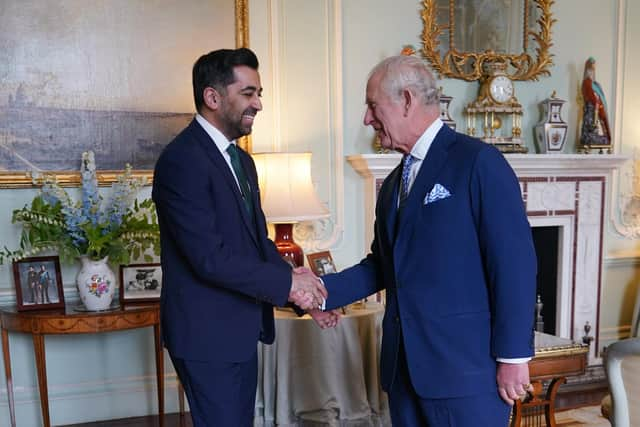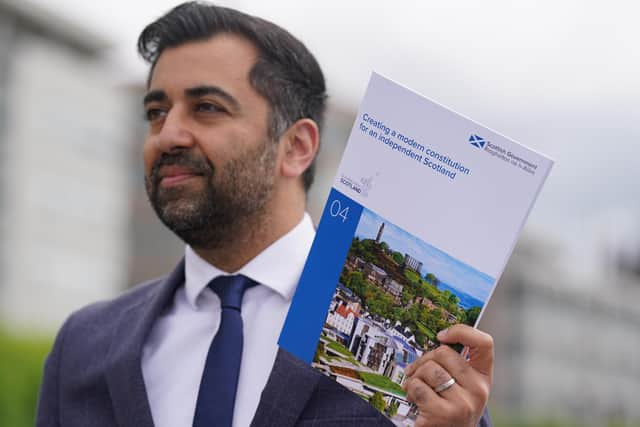Scots could vote on removing King Charles III as monarch within five years of independence under SNP plans
This article contains affiliate links. We may earn a small commission on items purchased through this article, but that does not affect our editorial judgement.
Scots could face a referendum on the future of monarchy within five years of becoming independent, Humza Yousaf has said.
The First Minister made the admission as he unveiled the latest of the Scottish Government’s independence prospectus papers, intended to update and restate the case for Scottish independence.
Advertisement
Hide AdAdvertisement
Hide AdIn the paper, Mr Yousaf outlined "radical” plans for Scotland to have a written constitution developed by the people of Scotland as part of a citizens’ assembly style process shortly after independence.


This would consider issues such as constitutionally protecting the NHS as free at point of need, protecting the right to strike, and a ban of nuclear weapons from Scottish shores. It would also consider whether to keep King Charles III as head of state or to make Scotland a republic.
Mr Yousaf has openly admitted he is a republican and during the SNP leadership contest said he wanted to see an independent Scotland consider abandoning the monarchy within five years of a Yes vote.
The newly published paper expands on this, stating that a constitutional convention would consider the role and nature of the head of state, with the whole constitution ultimately being put to a referendum with three to five years.
This could see Scots vote to remove the King as head of state and replace the monarchy with something like a presidential system, or another option.


Scotland would remain a constitutional monarchy during the first few years of independence, however, as part of plans for an ‘interim constitution’, which would take effect from day one of independence.
Mr Yousaf said: “The interim constitution is about providing on day one of independence that stability that's needed. We would continue as a parliamentary democracy with a constitutional monarchy.
“It would then be for the Constitutional Convention, who will be given the responsibility for drafting up a permanent written constitution, to consider what the model should be for the head of state.
Advertisement
Hide AdAdvertisement
Hide Ad“I think that is not a discussion that I would like to pre-empt in terms of the Constitutional Convention, but that is just one issue they should consider. And one of those should be whether or not continuing with a constitutional monarchy is appropriate or whether there should be an elected head of state.”
The First Minister also suggested the convention could look at the possibility of adding a second chamber to the Scottish Parliament in the form of an elected chamber such as a Senate. He agreed the final referendum on the constitution could effectively be on the question of keeping the King as head of state.
Mr Yousaf said when posed that question: “Hypothetically, if that is what a constitutional convention seeks to do. As I say, I'm not going to prejudge what a constitutional convention will say or what it will do.
“But it could well look at and probably should look at whether we have the right model in relation to a head of state in the future. You're absolutely right. The process will then be to put that permanent written constitution proposal to the people in a referendum.”
Mr Yousaf suggested the time required to develop a new constitution and hold a referendum on it could take three to five years following independence. He said the plans were “radical” and “fundamental to people’s lives right now”, particularly the idea of protecting an “adequate standard of living”.
The First Minister said a written constitution would “embody a set of longer-term, more fundamental values about what a country is for” and set out a “common understanding of a nation’s priorities”, as well creating a “standard below which no government should ever fall”.
“In the context of the Westminster system, these proposals do sound radical,” he said.
With the UK not having a written constitution in place – something Mr Yousaf said made the country a “global outlier” – he claimed Westminster could abolish the Scottish Parliament, which has been in place since 1999.
Advertisement
Hide AdAdvertisement
Hide AdSpeaking in Glasgow, the First Minister: “That’s not an abstract concept – it is worth remembering the UK Government is already seriously considering the repeal of the Human Rights Act, one of the most significant achievements of any UK Parliament in the last 30 years.
“In future, Westminster sovereignty could even allow the UK Parliament to repeal devolution through nothing other than a simple majority vote.”
The Scottish Greens committed themselves to campaigning for an elected head of state should Scotland become independent, stating that doing so would allow Scotland to become a “real democracy”.
Their constitution spokesperson, Ross Greer, said: “We can ditch the archaic notion that one family by magic and by birthright gets to rule over the rest of us. An independent Scotland will be a fairer, greener country and it will be a genuinely democratic one if we choose who our head of state is.”
However, the suggestion of a referendum on the monarchy was criticised by the Scottish Conservatives as an attempt to “divide people more than Nicola Sturgeon did”.
Donald Cameron, the party’s constitution spokesperson, said: “Humza Yousaf has once again used his push for independence to shamelessly pander to the anti-monarchists within his party.
“The monarchy remains one of our most loved and respected institutions in Scotland as we saw with the celebrations for King Charles’s coronation, as well as the outpouring of grief when Her Majesty passed away last year.
“By once again talking up scrapping a symbol of the United Kingdom as part of a push for a further referendum, it looks as though Humza Yousaf is aiming to divide people more than Nicola Sturgeon did.
Advertisement
Hide AdAdvertisement
Hide Ad“Rather than talking up the prospect of scrapping the monarchy, he should be focusing on Scotland’s real priorities such as the cost-of-living crisis and fixing our NHS.”
Scottish Labour’s constitution spokesperson Neil Bibby said the plans were “constitutional pipe-dreams”.
He said: “At the same time as Labour was unveiling its plan to transform Scotland’s economy and lead the way in the transition to clean energy, the SNP was indulging in the same old constitutional pipe-dreams.
“Humza Yousaf may say that he wants to enshrine the NHS in the constitution, but under his watch our NHS is on its knees. Humza Yousaf claims he wants to protect the rights of islanders, but his Government can’t even sort out the ferries. Humza Yousaf says he wants to defend local government, but his party and [the] Greens have cut council budgets year after year.
“While the SNP resort to pipe-dreams as the county crumbles under their watch, Scottish Labour is laying out a brighter future for our economy, our public services and our country.”
Scottish Liberal Democrat leader Alex Cole-Hamilton said the paper was an “insulting distraction” for those waiting for help with the cost-of-living crisis.
He said: "Islanders and NHS workers will take fresh SNP promises with a fistful of salt given they have been left to pick up the pieces. Humza Yousaf knows perfectly well that there is no public support for either breaking up the UK or another referendum, so he should focus on using the huge powers that devolution has brought for the good of the people of Scotland.”
Pamela Nash, chief executive of the pro-union campaign organisation Scotland in Union, said Mr Yousaf was “delusional” to think this was “among the priorities for the people of Scotland”.
Advertisement
Hide AdAdvertisement
Hide AdShe said: “We don't want his divisive referendum and we don't want a government distracted by constitutional nit-picking.”
Want to hear more from The Scotsman's politics team? Check out the latest episode of our political podcast, The Steamie.
It's available wherever you get your podcasts, including Apple Podcasts and Spotify.
Comments
Want to join the conversation? Please or to comment on this article.
